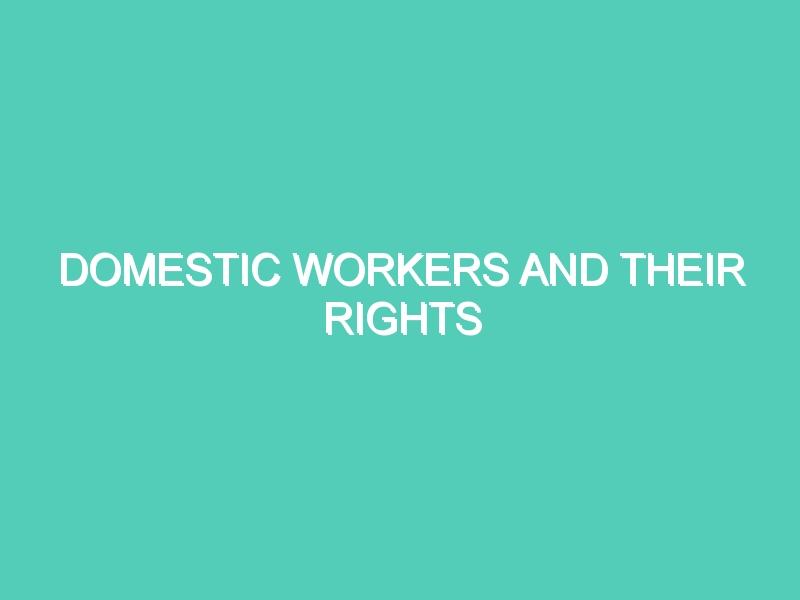INTRODUCTION
Domestic workers comprise a significant part of the global workforce in informal employment and are among the most vulnerable groups of workers. They work for private households, often without clear terms of employment, unregistered in any book, and excluded from the scope of labour legislation. Currently there are at least 67 million domestic workers worldwide, not including child domestic workers and this number is increasing steadily in developed and developing countries. Even though a substantial number of men work in the sector – often as gardeners, drivers or butlers – it remains a highly feminized sector: 80 per cent of all domestic workers are women.
Their work may include tasks such as cleaning the house, cooking, washing and ironing clothes, taking care of children, or elderly or sick members of a family, gardening, guarding the house, driving for the family, and even taking care of household pets.
A domestic worker may work on full-time or part-time basis; may be employed by a single household or by multiple employers; may be residing in the household of the employer (live-in worker) or may be living in his or her own residence (live-out). A domestic worker may be working in a country of which she/he is not a national, thus referred to as a migrant domestic worker.
At present, domestic workers often face very low wages, excessively long hours, have no guaranteed weekly day of rest and at times are vulnerable to physical, mental and sexual abuse or restrictions on freedom of movement. Exploitation of domestic workers can partly be attributed to gaps in national labour and employment legislation, and often reflects discrimination along the lines of sex, race and caste.
DOMESTIC WORK
The overall understanding of the concept of domestic worker is mostly clear. In this report, domestic work is understood as paid domestic services delivered to private households. There are three common elements in this definition. We will discuss these three here.
The first one is that the job includes services delivered to a private household. In case of dependent employment, the definition states that the jobholder’s employer is a private household. In case of own-account or self-employed workers, the definition states the worker’s services are delivered to a private household. The latter definition is much broader than the former definition.
The second element is that the job includes domestic tasks, thus tasks related to housekeeping. Clearly, this states that domestic tasks have to be distinguished from homework and workplaces at home. It should also be separated from agricultural work, though the boundaries are not always clear. Housekeeping has a broad meaning, including cooking, food preparation and dishwashing. It includes cleaning, washing and tidying up. It also includes child caring and caring for sick or elderly persons in the household. Finally, it also includes the tasks related to the organisation of housekeeping.
The third element is that the job includes payment for the services delivered. Thus, domestic work performed by members of the household’s family as part of unpaid household duties is not included in the definition. Discussions concern payment in kind. Domestic workers may be paid in food and subsistence, in addition to receiving financial remuneration.
NUMBER OF DOMESTIC WORKERS
The ILO (2015) estimates 67 million people are employed as domestic workers globally. This number is steadily growing worldwide. In 2010, conservative estimates found 52.6 million people doing this work, accounting for 3.6 per cent of global wage employment (ILO and WIEGO 2013). However, since domestic workers are undercounted in labour force surveys, the numbers could be far higher. In 2010, domestic work was highest as a percentage of total employment in Latin America and the Caribbean (7.6 per cent) followed by the Middle East (5.6 per cent).
Domestic Work and Gender
Women accounted for about 80 per cent of counted domestic workers in 2015. In fact, the ILO says about 1 in 25 women workers in the world are domestic workers.
As a percentage of women’s wage employment, the greatest proportions are found in Latin America and the Caribbean and the Middle East (ILO and WIEGO 2013).
- Middle East – one in three female wage workers
- Latin America and the Caribbean – one in four female wage workers.
However, in very few countries are more than 1 per cent of men employed in domestic service.
WORKING CONDITIONS OF DOMESTIC WORKERS
Most domestic work is informal, performed outside of labour regulations and social protections. To borrow the title of a 2010 Social Law Project Conference in South Africa (and subsequent publication), domestic workers are “exploited, undervalued ─ and essential.”
Several common features of domestic work set it apart from other types of paid work.
Isolated in Private Homes
Because domestic workers are employed in private homes rather than firms or enterprises, they can be invisible as workers and isolated from others in the sector. They are dependent on the good or bad will of their employer. Despite the concept of the home as “safe haven”, growing evidence suggests domestic workers are exposed to a range of unhealthy and hazardous working conditions.
Domestic workers often have a personal, intimate knowledge of their employers, but the relationship is highly unequal, leaving many domestic workers vulnerable to verbal, physical, or sexual abuse. Often differences in race, class, and citizenship increase this inequality.
Also, most of the tasks involved in domestic work are seen as “women’s work”, so are considered of low status and value. Tasks such as gardening, driving, or guarding have higher status and are typically done by men.
Finally, a widespread perception that labour standards cannot be enforced in private homes means many employers do not comply and the government does not enforce labour laws regarding wages, benefits, and working conditions.
Abuse, Harassment and Violence
According to the International Domestic Workers’ Federation, some face multiple forms of violence: physical abuse, intimidation, threats, bullying, sexual assault, harassment, being provided poor-quality food and a lack of privacy. Severe instances of violence, including murder, have been documented.
Certain categories of domestic workers face greater disadvantages. Live-in domestic workers experience more isolation, less privacy and more limited mobility, work longer hours, and receive a larger share of payments in kind (such as board). Living conditions are frequently poor. They are also more vulnerable to physical/sexual abuse by employers.
In 2018 and 2019, a delegation of domestic workers participated in discussions at the International Labour Conference (ILC) around violence and harassment in the world of work; they succeeded in securing an ILO Convention (C190) on Eliminating Violence and Harassment in the World of Work.
Earnings or Wages
Data on wages in domestic work are available in the ILO Bureau of Statistics Database for only a few countries. The data show that women employed in domestic work receive lower wages than women working in most other jobs, and lower wages than men working as domestic workers.
A compilation of official data from 19 Latin American countries indicates that the earnings of domestic workers are among the lowest of all occupations (Tokman 2010).
- Across Latin America, women’s earnings in domestic work are 73 per cent of men’s.
- Domestic workers earn 41 per cent of the earnings of the urban workforce.
- Women domestic workers earn only 76 per cent of the earnings of all women in informal employment.
- 36 per cent of domestic workers are from households below the poverty line, compared to 26 per cent of the total urban workforce and 35 per cent of wage workers in informal enterprises.
- In Costa Rica, women domestic workers earn an average of 40 per cent of the wages paid to other women workers, while the comparable ratio for men is 67 per cent
- The proportion of domestic workers with labour contracts and/or social protections is very low compared to other occupations.
Indian Law about Domestic Worker and their Rights
Domestic Workers (Registration, Social Security and Welfare) Act, 2008 was introduced to regulate payment and working conditions and check exploitation and trafficking of women and other young household workers. Domestic workers are in the unorganized sector and unorganized, hence there are practical difficulties to cover them. Though applicable to both men and women, it assumes significance for women due to their presence in large numbers in the occupation. (Act is subjected to State legislation and therefore the State governs its implementation. However, Central notification date is still pending).
Applicability of the Act
- This Act is applicable to whole of India except state of Jammu and Kashmir.
- It does not apply to such domestic workers who have immigrated for employment to any other country.
- Employment of child is prohibited under any law for the time being in force as a domestic worker or for any such incidental or ancillary work.
- Implementing Authority under the Act will be Central Advisory Committee, State Advisory Committee and District Board.
Registration as Beneficiary
The Act provides that every domestic worker who has completed 18 years of age, but has not completed 60 years of age, and is engaged in any domestic work for not less than 90 days in the preceding 12 months, can be registered as a domestic worker. (Section 16)
Hours of Work and Annual Leave with Wages
Any domestic worker (male or female) registered under the Act who lives in the premises where workplace is situated is entitled to daily rest period of at least 10 consecutive hours between ending and recommencing work. Also the domestic workers living in the house are entitled to annual leave with wages for at least 15 days. (Section 22)
Minimum Wages
All registered domestic workers should be paid minimum wages as per the Minimum Wages Act, 1948. (Section 22)
Safety & Penalty Provisions
The Act specifically makes provisions for penalty in cases where any person knowingly sends, directs or takes any girl or woman domestic worker to any place for immoral purposes or to a place where she is likely to be morally corrupted or in any manner sexually exploited. Such a person shall be subjected to imprisonment for a minimum period of 6 months which may extend upto 7 years and fine up to Rs. 50000 or both. (Section 23)
Offences and Penalty
Any service provider who contravenes the provision of the Act shall be punishable with imprisonment of term which may extend to 3 months and with fine which may extend to rupees two thousand, or with both. In case of continuation of contravention additional fine which may extend to rupees one hundred for every day shall be imposed.
If an employer fails to comply with the provisions of the Act they shall be punished with fine which may extend to rupees two thousand.
If any person who willingly obstructs any officer who is authorized by the District Board to conduct inspection or refuses to cooperate in inspection shall be punishable with imprisonment for a term which may extend to 3 months and with fine which may extend to rupees two thousand, or both.
Article Written By- Saurabh Kumar Gangwar
Law Student–DR B.R Ambedkar National law university
(HRDI Work From Home Internship)



